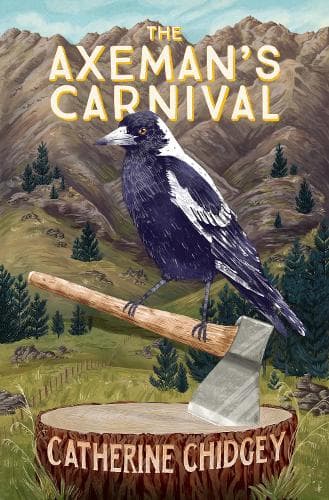Review: The Axeman’s Carnival
Reviewed by Hannah Tunnicliffe
I’ll come clean: I love Catherine Chidgey. Her books aren’t just beautifully written, they’re engaging and trot along at a good pace. They’re peppered with deep emotion, humour and descriptions that make you want to grab a highlighter and her narrators are surprising and enlightening. What more could you want?
But The Axeman’s Carnival isn’t just another book in the repertoire of a great author. It is, on its own merits, unique and compelling. It has enough foreboding to keep you on the hook, with enough sweetness and comedy to keep you happy to be on the hook.
The Axeman’s Carnival joins that great canon of literature told from an animal’s perspective. The animal at the centre of Chidgey’s The Axeman’s Carnival, through whose amber eyes we see the world, is Tamagotchi (“Tama”) the magpie. Tama is rescued and mothered by Marnie, a farmer’s wife, part time retail assistant, sister and daughter. Marnie’s mother Barbara is constantly reminding her of her shortcomings: ‘Men like him appreciate a trim wife. I’m telling you this because I love you’ - but to Tama, dark- haired, dark-eyed Marnie is beautiful and perfect. The feeling is mutual. Marnie feeds Tama by hand, gives him a room in their house and makes a nest for him in one of her jerseys. To her concerned and critical axeman husband, mother and sister, Marnie explains that Tama is special. And she is right. Not least of all because Tama can speak.
Mimicking Marnie, her husband Rob, as well as visitors, television and radio, Tama produces hilarious, often inappropriate commentary at choice moments. He repeats lines from crime shows or expletives he’s heard. Even the voice we read as his thoughts borrows language from the humans around him. His one-liners are nonsensical, hilarious and sometimes deeply meaningful and prophetic.
After photographing Tama in cute poses and dress-ups, Marnie helps make him an internet sensation. Through Tama’s newfound fame and merchandise he looks set to save Rob’s family farm from debt and doom. Tama comments, with the longing of the exploited: ‘They love me… And I earn them money. And they love me.’ The Axeman’s Carnival is full of foreboding. There is a lurking sense of menace in the not-too-distant future and Chidgey keeps you waiting for it. On a sharpened axe edge.
Chidgey is a national treasure and her protagonist teaches us: animals and humans can be cruel but they can also be loyal, loving and decent too.
The beauty of stories with animal protagonists is the mixture of naiveté and wisdom they bring to the human world they observe. Tama is an innocent, a jester and an outsider. By his own admission Tama lives between worlds and perspectives: ‘And I belonged and did not belong. And I was bird and not-bird.’ Tama knows that magpies are mistrusted by humans as the bird who refused shelter in the ark and ‘the only bird not to sing at the crucifixion.’ He has to navigate being rejected by his bird family, mistrusted by many of his human one and celebritised by an internet audience. All Tama really wants is to be with his beloved Marnie.
The Axeman’s Carnival is loaded with symbolism. Tama means son or boy in te reo Māori and Marnie and “her special boy” mirror one another in many ways. They have both been let down and marginalised and have limited agency. The Otago farmhouse they live in, with bitter, jealous and rageful Farmer Rob, is infested with bora and rats. A consulting builder says: ‘Once the heartwood’s compromised the whole place is unsound. If you’d treated all this much earlier… As things stand, she’s well beyond repair.’ The reader knows this observation is not just about the house.
Clearly there is a wand-sweep of magic realism in the pages too, not just because it’s about a talking bird but also through Tama’s mother and brothers – ‘death by car, death by cold’ – who speak to him as ghosts. But despite the magic, fairy-tale and hint of fable, The Axeman’s Carnival is compelling and believable. The reader trusts that it is possible for a magpie to do and experience unusual, paranormal things because Chidgey has made Tama such a likeable and reliable narrator.
Unlike Chidgey’s previous works (The Wish Child and Remote Sympathy were both set in Nazi Germany) The Axeman’s Carnival occurs in rural New Zealand, with a storytelling elegance that makes it both very kiwi and universal. It is a dazzling and dizzying kaleidoscope portrayal of humanity and the natural world. There is beauty and brutality, love and violence, hilarity and disaster.
Chidgey doesn’t shy away from the awful realities of life on a farm including death, predation, infestation, exploitation, rot, disappointments, draughts and debilitating debt. Lambs die, workers are maimed and plush toys make more money than decades of hard labour. But amongst all of that Chidgey has created a moving tale with a charming protagonist.
As Tama describes towards the end of the book, it made ‘My heart a cherry about to split.’ Chidgey is a national treasure and her protagonist teaches us: animals and humans can be cruel but they can also be loyal, loving and decent too.
Reviewed by Hannah Tunnicliffe
